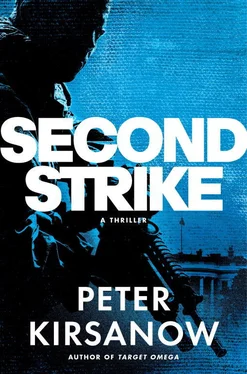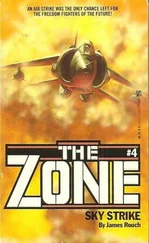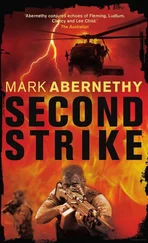He dispensed with a shave. He wasn’t going to a job interview; he was trying to remain alert and something less than repellent.
But the shower helped. He was feeling pretty good, all things considered. He put on some jeans and a gray T-shirt and poured himself a large cup of coffee, plopping in a couple of ice cubes so he could down it almost as quickly as he had the pot on the plane.
Reaching atop the refrigerator, where he kept an array of nutritional supplements, Garin pulled down powdered turmeric, ginger, and a container of creatine. Turmeric and ginger to relieve muscle soreness, creatine for muscles depleted by the Crucible. He put a teaspoon of each in a glass of water and swallowed the concoction in two gulps. He chased that with another cup of iced coffee.
From his black gym bag Garin pulled a SIG Sauer P226. Dwyer had given it to him along with several spare magazines. Garin placed the handgun in a holster at the small of his back and the spare magazines in his hip pockets.
He placed a call on one of the burners. It was answered on the first ring.
“Dwyer.”
“Matt tell you about the dead man’s house?”
“He did. Some of my men are there right now. Haven’t seen them this jacked since they left the teams. But they’re under orders not to do anything without you.”
“Good. I’m on my way. Send me a Google map of where they’ll be positioned.”
“We should let the FBI know at some point,” Dwyer said.
“Know what? That a dead guy answered his phone?”
“If Russian agents are using a dead man’s residence as a safe house, the FBI needs to know—especially if one of them’s Bor. We have no authority to go blasting in there by ourselves. If the stuff hits the fan, we’ll be in big trouble,” Dwyer said. “Mikey?”
“I hear you.”
“Then say something.”
“This is just surveillance. That’s all.”
“Bull. You don’t do surveillance. You do death and destruction,” Dwyer countered. “And that’s fine. But my men can’t be part of it. We have no authority. We’ll all go to prison.”
“Dan, I’m not suicidal,” Garin assured him. “Do you actually believe I would go into a house Bor might be in without an army surrounding the place?”
“Damn right you would. Remember who you’re talking to, buddy. I know you. I trained you. You think you’re freakin’ indestructible. That’s why you keep entering these nutty competitions. Daring someone or something to prove you’re not invincible. So far, you’ve never lost. But guess what, buddy? First time for everything. So promise me, before you move, we call the FBI. In fact, I’m calling them right now.”
“Don’t,” Garin said sharply. “Think about it, Dan. We know Bor was being helped by someone very high up in our government. So high up that they had the FBI after me during the EMP deal. Somehow, they even managed to get Delta after me. On American soil. In violation of about four thousand different statutes. That person or persons has never been captured or identified. Nothing’s changed. We call the FBI, Bor will know about it. The only people we can trust are the ones who proved trustworthy before: Olivia, Brandt, and the president. That’s it.”
Dwyer exhaled. “All right. I won’t call. But just surveillance. I’m telling my men, no matter what Garin does, they’re to stand down. No engagement whatsoever.”
“Good. I’m on my way.”
DALE CITY, VIRGINIA,
AUGUST 16, 12:55 P.M. EDT
Bulkvadze brought five men.
Ten. That’s how many Bor had told him to bring. Against one man. Ridiculous. Bulkvadze felt foolish while composing the team. Each looked at him as if he were crazed when he told them there would be five of them. To kill one man. It was insulting.
Bulkvadze couldn’t blame them. They were professionals. They’d proven their capabilities and worth. None were novices. Each had several kills to his credit—some even in the United States.
They were promised fifty thousand dollars apiece, ten thousand in advance. The amount quelled any grumbling. Bor had advanced one million dollars, with the balance of four million to be delivered upon verification of Garin’s death. The shooters’ share plus Bulkvadze’s hundred-thousand-dollar finder’s fee would come entirely from Abkashvili’s four million. Of course, Abkashvili would know nothing about the one million Bulkvadze kept for himself.
Bulkvadze had a clear view of where the action would occur. He was comfortably seated in his black Mercedes S600 with tinted windows in the parking lot of the B complex. The entrance to Garin’s basement unit in C complex was directly in front of him, down a gradual decline seventy yards away. His seat was racked all the way back to accommodate his large frame. It was as if he were in a movie theater. Only the popcorn was missing.
From his vantage point Bulkvadze could see each of his five shooters. Two of three primary shooters were deployed behind SUVs at forty-five-degree angles to Garin’s door. The third primary shooter was deployed behind a large Dumpster directly in front of and fifty feet away from Garin’s door.
The two secondary shooters were behind a row of hedges that separated the B and C parking lots. They were standing almost equidistant from Bulkvadze’s car and Garin’s front door. From their relaxed stances it was clear they had concluded, quite reasonably, that they would soon go home forty thousand dollars richer for doing nothing more than driving out to Dale City, Virginia.
There was no foot traffic in the vicinity. The stifling heat and humidity had chased the residents into their air-conditioned apartments.
The five men were visible to any B Complex residents who might happen to look out their windows, but Bulkvadze was unconcerned. People generally didn’t look out their windows unless there was a loud noise or a bright light or they were expecting someone. Most were looking at TVs, computer screens, phones, kids, or stoves. A parking lot and hedgerow couldn’t compete.
The five had, nonetheless, assumed poses of nonchalance, feigning scrolling through their mobile devices. A bit irritated, Bulkvadze thought their poses appeared somewhat less than random. Then again, he’d been on a number of crowded city streets where it seemed everyone was walking with their heads angled down toward their phone screens.
Bulkvadze’s own phone rested on the seat next to him. He would record Garin’s death and provide the recording to Bor for verification.
Although he was in no particular hurry, Bulkvadze preferred to get the matter over with. The longer Garin remained inside, the greater the probability that a patrol car would make a run past the complex or someone might pay Garin a visit. According to Bor, Garin rarely stayed in one place for long, but Bulkvadze was prepared to stay in place for as long as it took.
And it didn’t take long. The heads of all three primary shooters jerked upward from their screens simultaneously. They must’ve heard a noise in Garin’s apartment, Bulkvadze thought, or the sound of a doorknob turning. They placed their phones in their respective pockets and almost in unison pulled out their weapons and aimed them at the door. The secondary shooters pulled out their weapons also, holding them at their sides.
Bulkvadze saw the door beginning to open and the primary shooters tensing, weapons held at eye level. The doorway was black for a beat; then the blackness was broken by a gray T-shirt.
Bulkvadze raised his cell phone above the dash of his car and began to record the imminent demise of Michael Garin. The primary shooters each edged out from behind their respective hides in preparation for taking their shots. Natural human competitiveness made each want to claim credit for the decisive shot.
Читать дальше












